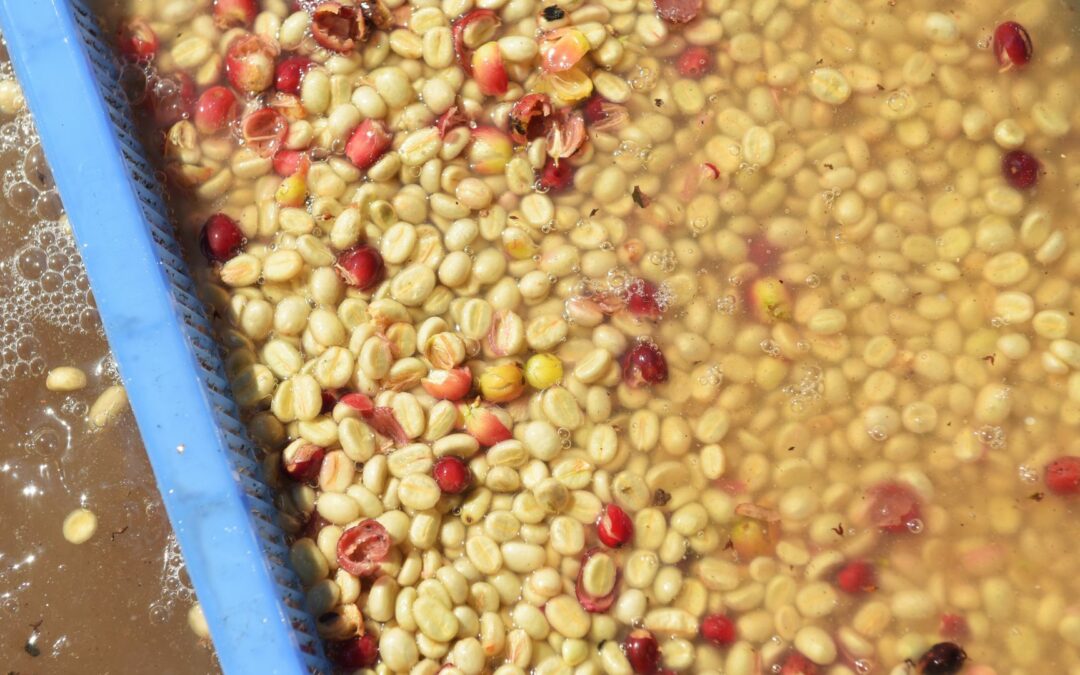Coffee that has been fermented in a controlled environment is called fermented coffee.
Here are some important facts about fermented coffee:
- Controlled fermentation process: Fermented coffee is made through a carefully controlled fermentation process in which yeast and bacteria are introduced to coffee beans.
- Improves flavour: Flavour is improved because the coffee’s natural sweetness and fruity aroma are brought out during fermentation. This occurs because, during fermentation, complex sugars in the coffee beans are converted into simpler sugars.
- Natural fermentation: Coffee cherries are left to ferment naturally in their juices, with no additional water or microorganisms added. This method is commonly used in coffee-producing regions.
- Different fermentation methods: There are several methods for fermenting coffee, including natural fermentation, anaerobic fermentation, and controlled fermentation. Each method produces distinct flavour profiles and characteristics.
- Anaerobic fermentation: Anaerobic fermentation entails placing coffee cherries in a sealed container and adding a specific type of yeast or bacteria. This method can produce distinct flavour profiles, such as chocolate and wine-like notes.
- Concerns about ethics: Some fermented coffees, such as Kopi Luwak (cat poop coffee), use animal excrement to ferment the coffee beans, which raises ethical concerns for some consumers.
- Popular in specialty coffee: Fermented coffee is becoming increasingly popular in the specialty coffee industry because it offers unique and complex flavour profiles that can appeal to coffee enthusiasts.
What Are Fermented Coffee Beans
Coffee beans that have undergone a natural fermentation procedure during processing are called fermented coffee beans. Natural yeasts and bacteria break down the sugars in the beans during this process to improve their flavour and aroma. It can happen through wet or dry fermentation techniques.
Coffee’s flavour and complexity can be significantly influenced by fermentation. Still, managing the process carefully is crucial to prevent defects or inconsistencies in the beans. Overall, fermented beans offer several health benefits beyond those of their non-fermented counterparts. They are a delicious addition to any healthy diet.
How Does Fermentation Impacts Coffee?
The flavour, aroma, and general quality of coffee can all be significantly influenced by fermentation. Here is a more thorough explanation of how fermentation impacts coffee:
- Aroma and Flavor: Natural yeasts and bacteria break down the sugars in coffee beans during fermentation, producing compounds that contribute to a distinct taste and aroma. This can make the flavour more complex and nuanced, with fruity, floral, or earthy notes.
- Alternate Flavour Profiles: Depending on fermentation, coffee may take on various aromas and tastes. While dry fermentation can produce a more complex, earthy flavour, wet fermentation frequently produces a sweeter, fruitier taste.
- Acidity and Brightness: Fermentation can make coffee more acidic and brighter, giving it a more lively and vibrant flavour.
- Fermentation Time: The amount of time the coffee spends fermenting can also affect how flavorful the coffee turns out. A more intense flavour can be produced by longer fermentation times.
- Removal of Outer Layers: Fermentation can assist in removing the coffee cherry’s outer layers, producing a more uniform and cleaner flavour profile.
- Negative Effect: On the other hand, improper management of fermentation can result in defects or inconsistencies in the beans, which will have an adverse effect on the flavour and standard of the coffee.
Coffee Fermentation Procedure
The fermentation of coffee beans is an important step in producing high-quality coffee beans. Breaking down the sugars and mucilage in the coffee cherries results in distinct flavour and aroma profiles in the coffee beans. Here’s a more in-depth look at the coffee fermentation procedure:
- Soaking: Coffee beans are soaked in water to facilitate contact between the beans and the microorganisms responsible for fermentation.
- Inoculate the Beans: The soaked beans are inoculated by adding bacteria and yeast as a liquid starter solution (SCOBY). You can use a variety of starter solutions to ferment your coffee beans in a variety of ways, resulting in a variety of aromas and flavours.
- Waiting: The actual fermentation happens in this step. To allow the yeast and bacteria to alter the chemical makeup of your beans, you must let the beans sit for one to two days.
This alteration can improve the coffee’s flavour, aroma, body, and digestibility. Furthermore, you must closely monitor your beans and consider variables such as temperature, time, airflow, light exposure, etc. Together, these elements can make or break your coffee’s quality, from sweetness and aroma to colour and shelf life. - Washing: The coffee beans are washed after fermentation to remove any remaining fruit or debris.
- Drying: The beans are dried in the sun to remove any remaining moisture before being roasted. There needs to be careful management of the drying process to prevent mould and other defects from appearing, and this can take several weeks.
- Roasting: The roasting process is the key to bringing out coffee beans’ full flavour and aroma. Roasting is subjecting coffee beans to high temperatures to cause them to expand and release oils that contribute to the beverage’s distinctive flavour and aroma.
- Grinding: The roasted coffee beans must be ground into a finer powder before being used in a coffee maker. The taste and intensity of a cup of coffee can be altered by adjusting the size of the grind.
What Are The Different Types Of Fermentation?
There are two primary types of fermentation used in coffee processing:
- Kefir: Cow or goat milk is inoculated with kefir grains to ferment coffee with Kefir. Using milk containing lactose would be the ideal choice since fermentation requires sugar. If you want to add Kefir to your coffee, remember that it can’t be done at a high temperature. The yeast and bacteria in the culture starter will die when the temperature is too high. This stops fermentation from happening.
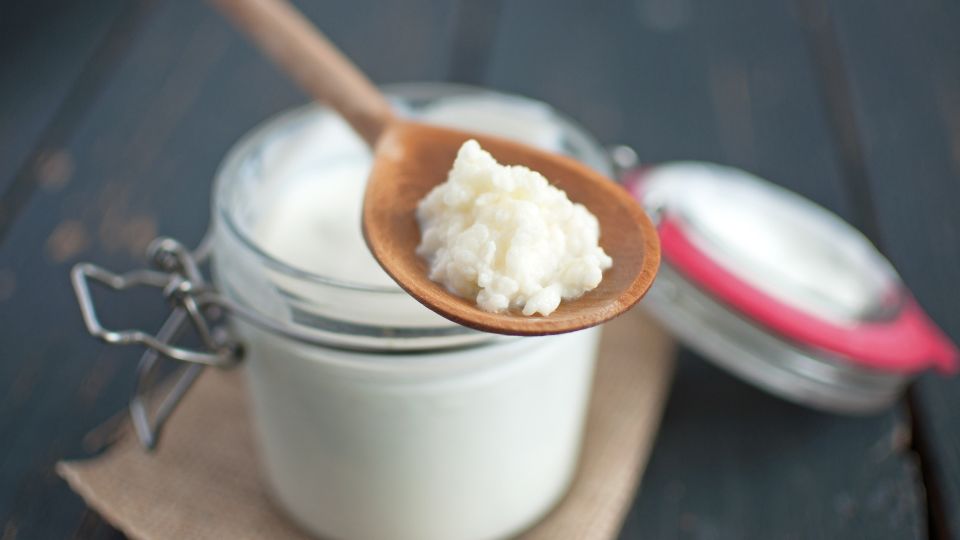
- Kopi Luwak: Kopi Luwak, also called civet coffee, is a special kind of coffee made using a fermentation process that uses a civet cat’s digestive system. The civet cat consumes the coffee cherries, breaking down the fruit’s skin but leaving the coffee beans unharmed.
The beans are then collected, cleaned, and prepared for roasting after the cat has passed waste on to them. Kopi Luwak’s distinctive flavour, which is frequently described as earthy, nutty, and with a hint of chocolate, results from fermentation during the digestive process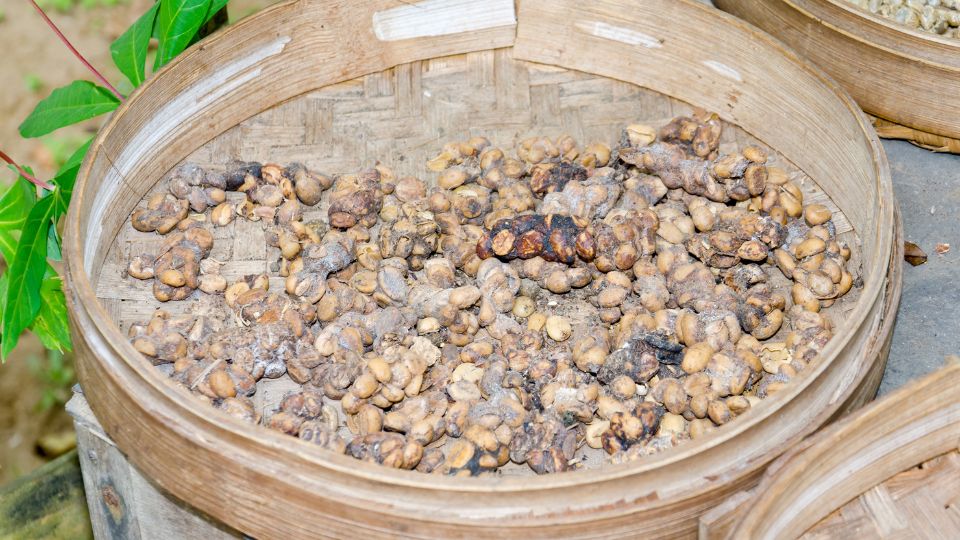
How Does Fermented Coffee Taste?
Fermented coffee can have a more complex flavour profile, with notes of fruit, floral, and acidity and interesting flavours like chocolate and spice. However, the degree of fermentation can also affect the taste, which some coffee drinkers may only appreciate.
Difference Between Fermented Coffee And Espresso Shot
| Fermented Coffee | Espresso Shot |
| Fruity and floral taste | Bold and intense flavour |
| Made by natural fermentation of coffee cherries | Made by forcing pressurised hot water through finely-ground coffee beans |
| Typically brewed using immersion or drip methods | Typically brewed using an espresso machine |
| Longer brewing time | Shorter brewing time |
| Generally has a lighter colour and texture | Generally has a dark colour and creamy texture |
| Lower caffeine content | Higher caffeine content |
| It may have a slightly tangy taste | It may have a slightly bitter taste |
How Does Fermented Coffee Get Affected By Moisture?
There are a few ways roasted, fermented coffee can be affected by moisture evaporation. Fermented coffee’s fruity and floral notes can be amplified through proper moisture evaporation, resulting in a well-rounded and flavorful cup.
Over-roasting and burnt flavours result from too much moisture loss, while a higher moisture content can cause flavour and quality variations. Uneven roasting due to excess moisture also has the potential to smother subtle flavours and aromas.
What Is The Effect Of Moisture On Fermented Coffee?
Cultured coffee beans have undergone a controlled fermentation process with specific microorganisms, such as bacteria and yeast, to develop novel and complex flavours.
These microorganisms ferment the coffee beans, breaking down the sugars naturally present in the beans to produce aromatic compounds and organic acids.
Beans can be fermented using controlled additions of specific microorganisms that promote the growth of desirable bacteria and yeast growth while inhibiting harmful microorganisms that might trigger spoilage or off-flavours.
There is no easy way to replicate a coffee’s distinctive flavour. Still, it is possible to maintain consistency by carefully managing the fermentation process with carefully selected microorganisms. Depending on the microorganisms used and the duration of fermentation, the final flavour profile may feature fruity, floral, or earthy undertones.
What Is The Difference Between Green Coffee Beans and Coffee Kombucha
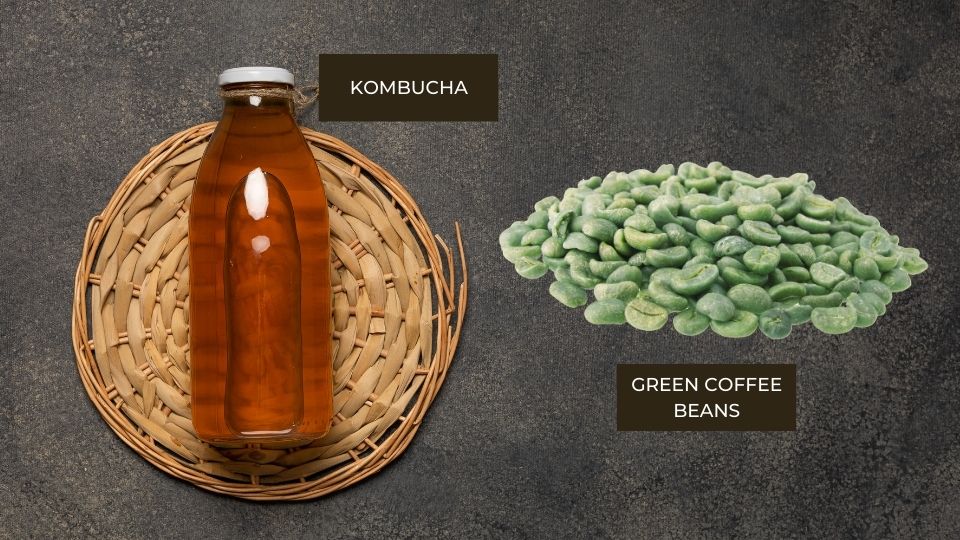
Green coffee beans and coffee kombucha are, in general, two different products that each have their own set of qualities and uses. A closer comparison between the two is given below:
| Differences | Green Coffee Beans | Coffee Kombucha |
| Definition | Green beans, or unroasted coffee, are raw ingredients sold after being harvested from the Coffee plant. | A fermented coffee drink contains sugar, SCOBY, and brewed coffee. The SCOBY digests the sugar, resulting in a tart, carbonated coffee. |
| Taste | These beans are not typically used in beverages because of their sour flavour. | It has a slightly sour and sweet flavour, with a slight effervescence from the fermentation process. It is consumed on its own as a beverage. |
| Uses | These beans are primarily used as a raw material in the production of coffee. They can also be taken as a supplement to reap the health benefits. | It is commonly consumed as a standalone beverage due to its flavour and potential health benefits. It can also be used in recipes or as a replacement for acidic beverages like vinegar. |
| Health benefits | These beans contain a high concentration of chlorogenic acid, a type of antioxidant that may help reduce inflammation and protect against various chronic diseases. The majority of the chlorogenic acid, however, is lost during the roasting process. | Its probiotic content may aid in digestive health and immune system function. It is much healthier than sugary drinks because it contains little sugar and few calories. |
What Is The Difference Between Fermented Coffee, Unfermented Coffee And Regular Coffee?
Here’s a detailed table outlining the distinctions between the three:
| Differences | Fermented Coffee | Unfermented Coffee | Regular Coffee |
| Definition | Fermented coffee, also known as natural coffee, is made by soaking coffee beans in their mucilage for an extended period, usually up to two weeks. | Unfermented coffee, also known as washed process coffee, is made by washing coffee beans in water to remove mucilage before drying. | Regular coffee, also known as dry process coffee or natural coffee, is made by drying coffee beans while the mucilage remains intact. |
| Fermentation process | Yes | No | No |
| Processing method | Natural (dry) method | Wet (washed) method | Natural (dry) method |
| Flavour profile | Complex and fruity, with sour and sweet notes | Mild and neutral, with floral and fruity notes | Rich and bold, with nutty notes |
| Acidity level | High | Moderate to high | Moderate to low |
| Caffeine content | Slightly lower | Same as regular | Same as regular |
| Processing time | Longer (up to 2 weeks) | Shorter (1-2 days) | Shorter (up to 2 weeks) |
| Health benefits | Probiotic, digestive health benefits, potential immune system boost | None | Antioxidant, anti-inflammatory, and brain-boosting effects, potentially reduced risk of chronic diseases |
Does Coffee Beans Fermentation Make The Coffee Sweeter?
Some ways in which coffee bean fermentation can enhance the coffee’s sweetness are as follows:
- Breaks down natural sugars: During the fermentation process, the natural sugars present in the coffee beans are broken down into simpler sugars.
- Conversion of sugars into organic acids: Enzymes and microorganisms consume the sugars in coffee beans and convert them into lactic acid, acetic acid, and other organic acids, which enhance the coffee’s sweetness and fruitiness.
- Balances bitterness and acidity: These organic acids can balance the naturally occurring bitterness and acidity in coffee, enhancing the perception of sweetness.
- Release of aromatic compounds: The fermentation process can result in the release of aromatic compounds that contribute to the overall flavour and aroma of the coffee, as well as enhance the perception of its sweetness.
- Factors affecting sweetness: The degree of sweetness and other flavour characteristics that result from fermentation are influenced by variables such as the duration of fermentation, the type of microorganisms involved, and the unique characteristics of the coffee beans themselves.
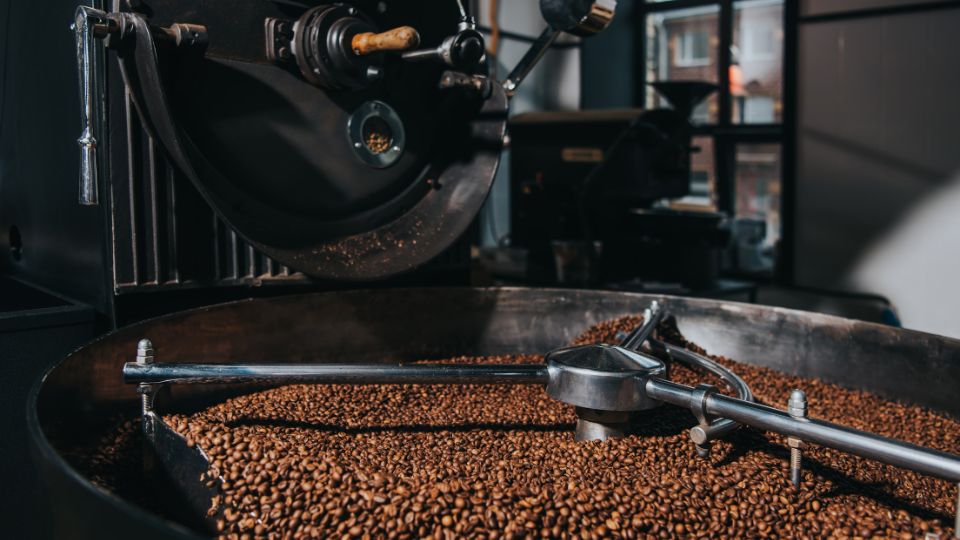
Coffee Production Industry In Australia
Australia’s coffee industry has recently expanded to meet surging demand for niche coffee blends and handcrafted roasts.
IBISWorld predicts that over the next five years, the Australian coffee manufacturing industry will maintain growth of roughly 0.5% per year in revenue.
The increasing demand for coffee-related products like premium coffee and coffee capsules primarily drives this. There are approximately 10,000 job openings for baristas in Australia, and the job market is expected to grow at a rate of 7.7% over the next few years.
This makes the profession an attractive option for those looking for work. If you want to learn how to be a barista, you should contact a training provider that has received the necessary accreditation.
According to the Australian Government labour market insights, about 37,200 baristas make a living in the coffee industry. Expert baristas who consistently deliver delicious coffee and friendly service will likely remain in high demand.
Specialty coffee shops and pop-up coffee bars are becoming increasingly popular as an alternative to the standard café, which may open up new venues for baristas to showcase their talents.

